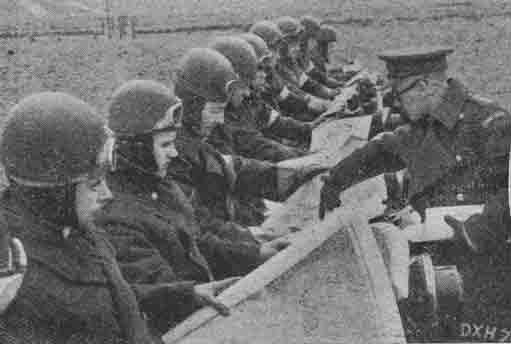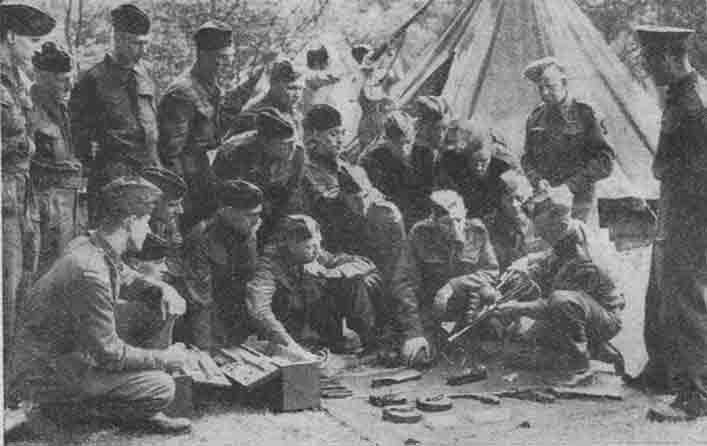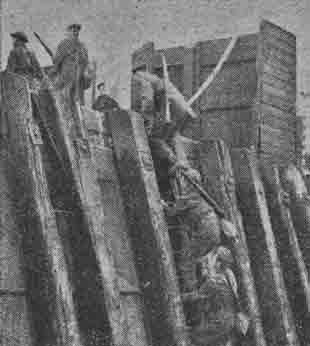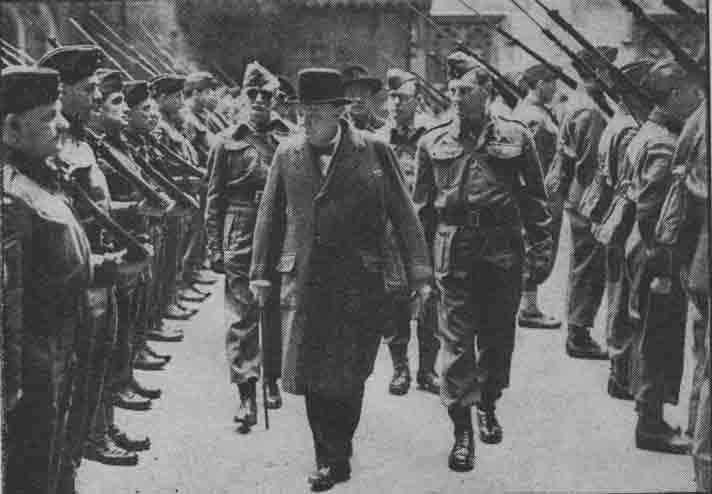GENERAL INFORMATION ON THE HOME GUARD
SECOND ANNIVERSARY
14th MAY 1942 |
This
is a page of the
GENERAL INFORMATION ON THE HOME GUARD
section of www.staffshomeguard.co.uk.
Please go to Site
Map for complete site contents.
| The following article comes from a long defunct magazine, "The War Illustrated", edited by Sir John Hammerton (Issue no. 130, Volume 5, dated June 12th 1942, priced fourpence). Grateful acknowledgement is made to the author, the publishers and their successors. |
THE HOME GUARD IS TWO YEARS OLD
On May 14, 1942, the Home Guard celebrated its second birthday. Some account of the lively
progress made by Britain's vigorous citizen army during the past year is here given by our Picture
Editor, J. R. Fawcett Thompson, who has been a member of the force since its inception.
"YOURS is a great responsibility, having in mind the vital part you have to take in the security of the United Kingdom. The test has yet to come, and when it does the strain on our endurance and on our faith will be great. It will call for the best that is in us of courage and self-confidence". In these solemn words did Lt.-Gen. Sir Bernard Paget, C.-in-C. Home Forces, pay tribute to the Home Guard on the occasion of its second anniversary.
Looking back at the work done and the improvements effected during the past twelve months, it is indeed abundantly clear that the progress made by the force in its second year has been as remarkable - if not, perhaps, as spectacular - as that which characterised 1940-1941. Under its able Director-General, Lord Bridgeman (who succeeded Maj.-Gen. T. R. Eastwood in May 1941) the Home Guard has gone ahead to such purpose that it is now an essential part of Britain's defences against invasion.
If and when the Home Guard goes into action, it will be against the picked troops of the enemy, and the training its members are now receiving, based on a full realisation of this harsh fact, is being directed to practising units in their battle role. The only advantage the Home Guard can claim over the fully-trained soldier is that he can fight on his own ground, and it is this great asset that must be exploited to the full.
While the force's main operational role has changed little since 1941, the scope of its activities has been enlarged to include the manning of certain anti-aircraft sites and coastal defence guns, thus freeing units of the regular army for service overseas. The former duties were first taken over on a restricted scale early in 1942, but so success-fully were they carried out that the scheme was subsequently considerably extended. Recruiting for coastal defence work  is about to begin, and there is little doubt that it will meet with an equally enthusiastic reception. A number of transport companies have been formed which will take over vehicles commandeered for military use in the event of invasion, while dispatch riders
are now being specially trained under Army supervision. Particular attention has been paid to Intelligence, and all units now have specialist officers skilled in this vital work with contacts in their individual Companies. Close cooperation is preserved with the Police and Civil Defence authorities. is about to begin, and there is little doubt that it will meet with an equally enthusiastic reception. A number of transport companies have been formed which will take over vehicles commandeered for military use in the event of invasion, while dispatch riders
are now being specially trained under Army supervision. Particular attention has been paid to Intelligence, and all units now have specialist officers skilled in this vital work with contacts in their individual Companies. Close cooperation is preserved with the Police and Civil Defence authorities.
Early in 1942 an important change in organisation was made that affected every Home Guard. This was the introduction of compulsion, which meant in effect that after February 16 no member could resign unless in exceptional .cfrcumstances, and that a maximum training period of 48 hours per month was obligatory. In addition, power was given in the event of enemy attack for units to be moved outside their own areas should the military situation so dictate. Though at first sight drastic and far-reaching, this alteration proved in practice to be advantageous as far as existing Home Guards were concerned. In point of fact, many thousands of them had for long been putting in more hours of duty than the required maximum, while what small degree of absenteeism there may have been almost disappeared under the new regulations. As regards the conscription of civilians into the Home Guard, the compulsory order has now been applied in all civil defence regions, and in many districts calling-up papers have already been sent out.
New Methods in Training
Since the summer of 1941 notable alterations and improvements have also been made in training, which now comes directly under the C.-in-C. Home Forces. Though the long, dark evenings of the  past winter necessitated much time being spent indoors, the instruction and practice then given (e.g. weapons training, sand-table exercises, map-reading) were planned with the object of their being translated into action in the field at the first suitable opportunity. The most significant feature of the field operations themselves was the change-over from purely defensive tactics to those of vigorous attack, in which the principle? of "Fire and Movement " played a decisive part. past winter necessitated much time being spent indoors, the instruction and practice then given (e.g. weapons training, sand-table exercises, map-reading) were planned with the object of their being translated into action in the field at the first suitable opportunity. The most significant feature of the field operations themselves was the change-over from purely defensive tactics to those of vigorous attack, in which the principle? of "Fire and Movement " played a decisive part.
 Of definite advantage to training was the recent decision to abolish the always unsatisfactory
combined post of Quartermaster and Adjutant, and appoint separate officers for each function. So much good work was done through the year by the two War Office Schools - one in England and the other in Scotland - for battalion, company and platoon commanders, that a third is to be formed shortly in the Midlands which will be capable of handling 70 students at a time for a week's course. For the vast majority of Home Guards, however, it is impossible to get away for a week at a time, and to a proportion of these five Travelling Wings, operating mainly in country districts, have brought instruction on the spot: this arrangement has so well proved its worth that the number of Wings is to be increased to 27. Also planned for the near future is the long-needed establishment of Street-Fighting Schools, an innovation that will receive a ready welcome, especially from city units. Great assistance has been given, too, by the intensive weekend courses energetically provided at the Command Weapon Training Schools, and no praise can be too high for the enthusiastic and hard-working instructors at these camps who have made special study of the Home Guard's peculiar problems and given of their best accordingly. Of definite advantage to training was the recent decision to abolish the always unsatisfactory
combined post of Quartermaster and Adjutant, and appoint separate officers for each function. So much good work was done through the year by the two War Office Schools - one in England and the other in Scotland - for battalion, company and platoon commanders, that a third is to be formed shortly in the Midlands which will be capable of handling 70 students at a time for a week's course. For the vast majority of Home Guards, however, it is impossible to get away for a week at a time, and to a proportion of these five Travelling Wings, operating mainly in country districts, have brought instruction on the spot: this arrangement has so well proved its worth that the number of Wings is to be increased to 27. Also planned for the near future is the long-needed establishment of Street-Fighting Schools, an innovation that will receive a ready welcome, especially from city units. Great assistance has been given, too, by the intensive weekend courses energetically provided at the Command Weapon Training Schools, and no praise can be too high for the enthusiastic and hard-working instructors at these camps who have made special study of the Home Guard's peculiar problems and given of their best accordingly.
Cooperation with the Field Army has developed steadily during the year, and combined exercises have become a valuable and increasingly popular part of operational training. In certain areas, moreover, it has been found practical and mutually beneficial to affiliate the Home Guard to regular units.
The position as regards equipment - that ever-present anxiety of the Home Guard - has undoubtedly improved in many directions, and the great majority of units are now fully supplied with clothing, steel helmets and anti-gas equipment. Webbing pouches, now being issued, meet a want of long standing. Most important of all, the supply of personal automatic weapons has certainly been accelerated in recent months - for which, considering the vast demands on the armament industry, the Home Guard should be doubly thankful. Furthermore, a new weapon - the machine-carbine - is being produced in quantity, and will replace to some extent the popular tommy-gun, the latter arm being concentrated in certain Commands only so as to facilitate repairs and replacements.
Four types of grenade are being provided in large numbers, while the Home Guard's two main anti-tank weapons, the Blacker Bombard and the Northover Projector, have by now been issued to many units.
Taking a comprehensive view, therefore, the past year must be recognised as one of steady increase in the fighting power and efficiency of Britain's citizen army, with every prospect of this notable progress being maintained through the months that lie ahead. Mr. Churchill's words to the Palace of Westminster unit when he inspected them on May 12, 1942, fittingly sums up the Home Guard today. "If in 1940", he said, "the enemy had descended suddenly in large numbers from the sky in different parts of the country, he would have found only little clusters of men, mostly armed with shotguns, gathered round our searchlight positions. But now, whenever he comes - if ever he comes - he will find, wherever he should place his foot, that he will immediately be attacked by resolute, determined men who have a perfectly clear intention and resolve, namely to put him to death or compel his immediate surrender.''

The PALACE OF WESTMINSTER
Home Guard were inspected by the Prime Minister on the occasion of the Force's 2nd anniversary. "To invade this island by air", said Mr. Churchill, "is to descend in a hornets' nest . . . There is no part of that nest where the stings are more ready and their effective power to injure more remarkable than here in the ancient Palace of Westminster".
THE KING HONOURS THE HOME GUARD
THE second year in the life of the Home Guard, which ends today, has been one of marked and continuous progress, I have watched with satisfaction the growing efficiency of the force in training, equipment, and cooperation with the Regular Army as well as the Civil Defence services.
Many of the original volunteers have by now unavoidably left the Home Guard and many have joined the Regular Forces. They leave behind them a great tradition of service and comradeship which will inspire the new recruits now enrolling for the defence of their country.
Whatever the coming year may bring, 1 know that the Home Guard will offer the fiercest resistance to any enemy who may set foot on these shores, and that its members will spare no effort to make themselves ever more ready for battle.
In order to mark my appreciation of the services given by the Home Guard with such devotion and perseverance, I have today assumed the appointment of Colonel-in-Chief of the force, and I send my best
wishes to all its members.
GEORGE R.I.
Special Army Order, May 13, 1942
|
|